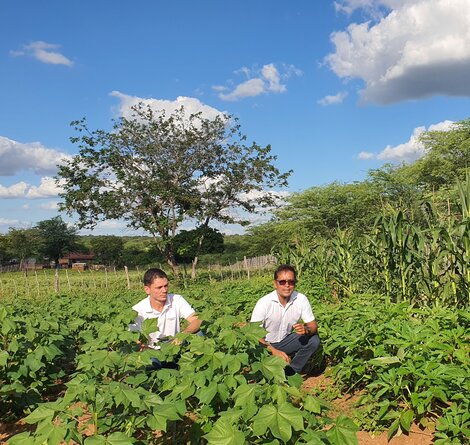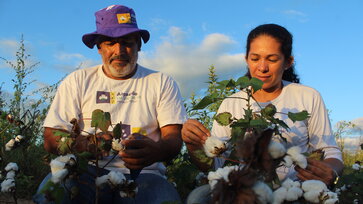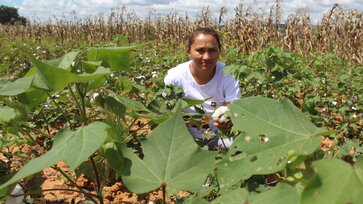Cotton in Agroecological Intercropping in Brazil
Project description
The Cotton in Agroecological Intercropping project aims to contribute to promoting a living income for 2.000 farming families in the semi-arid region of the Brazilian northeast. It does this by promoting cotton production in agroecological systems combined with food crops through participatory organic certification carried out by grassroots family farming organizations. Understanding both the social and environmental value of agroecological practices, the project’s other main objective is related to climate change mitigation and adaptation.
The first phase of the Project, from 2018 to 2022, had as its main objective to strengthen 7 rural organic certified family farming associations through agroecological production and access to markets. The current phase (2023 to 2026), in partnership with GIZ, aims to further promote the autonomy of these grassroots associations by enabling a decent income for family farming. This is based on the premise that the adoption of agroecological practices and subsequent participatory organic certification will: a) provide a guaranteed income from the cotton produced; b) allow farmers to achieve higher added values for their other organic products (for example, sesame, peanuts, corn, sunflower, beans and others), c) contribute to reducing social inequality in agricultural communities with a particular focus on gender equity and encouraging the participation of young people, and d) guarantee healthy food – increasing food security – due to the environmental regeneration of the landscape.
Within the scope of this partnership, one of the activities will also be the estimation of emissions and soil carbon stock, aiming to understand the extent to which agroecological intercropped cultivation is contributing to the mitigation of climate change when compared to conventional agricultural methods.
Partners
- Diaconia
Diaconia is a non-profit, Christian-inspired social organization committed to promoting justice. It is now 56 years old. It is present in semi-arid territories of the Brazilian Northeast and its main commitment is to 'serve to transform lives'. To this end, it encourages the empowerment of women, men, young people and farming families; and mobilizes communities, churches and other social groups for the defence and enforcement of human rights. - VEJA Fair Trade
VEJA is a French footwear brand, created in 2004. From the beginning, VEJA has been creating its products in a different way, mixing social projects, economic justice, and ecological materials. VEJA uses Brazilian and Peruvian organic cotton for the canvas and laces, Amazonian rubber for the soles, and various innovative materials conceived in recycled plastic bottles or recycled polyester. VEJA buys organic cotton directly, respecting fair trade principles before weaving it into the canvas, laces, and uppers used in VEJA sneakers.
Video report
Smallholder farmer Maria Cândida reports on the benefits of intercropping in her cotton fields.


